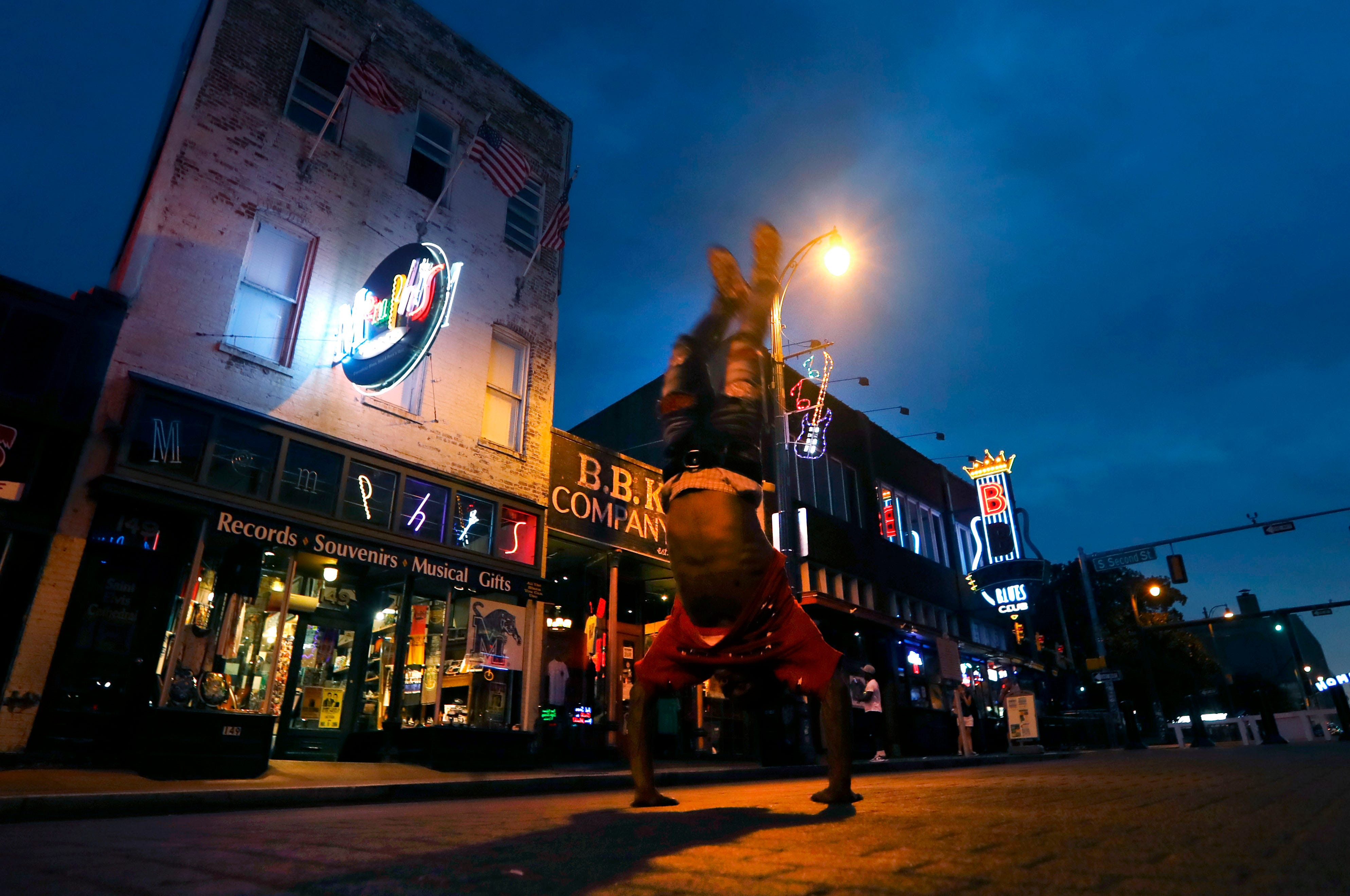We’re back to work (many of us) and back to school (in some way or another), but we’re not back to normal.
The first coronavirus cases in the U.S. were detected in January. The first confirmed coronavirus case in Shelby County was reported on March 8.
In the six months since, Shelby County has reported more than 28,000 cases and close to 400 COVID-19 deaths. Lifestyles have been realigned for a new stay-at-home culture. Memphis and the surrounding region have endured lengthy shutdowns of nonessential businesses. Masks have been encouraged if not forcefully mandated.
The gradual so-called reopening of the city has been met with relief and suspicion. But even those who claim the threat of the virus is exaggerated can’t claim the threat of the virus hasn’t altered the way they live.
On Sept. 1 reporters and photographers with The Commercial Appeal spent a day with people in Shelby County, to capture 24 hours, more or less, in the life of our pandemic-altered home.
From Beale Street to the Liberty Bowl, from a home for shut-ins to a drive-in theater, we checked in with bakers, musicians, carriage drivers and others, as they dealt with life (a mom dealing with her kids) and death (a funeral home director). We wanted to see how they — how we — are coping. And if the coping leads to hoping — hoping for better days ahead, when social distancing is a personality choice rather than a health precaution; when masks are worn by most people on Halloween; and COVID-19 is a disease of the past, like polio and smallpox.

Caminos de Michoacan bakery

Crickets chirp under a dark sky as 51-year-old Demetrio Perez unlocks the door of the bakery. He walks to the kitchen and measures ingredients into a big bowl.
Soon his 29-year-old brother, Itiel Perez, arrives. Using a mixing machine and other tools, the brothers quickly make a batch of pig-shaped cookies, then dozens of white bread loaves.
More than an hour passes, and the brothers go to the dining room for a break with coffee and a plate of warm cookies. Itiel Perez says before the pandemic and recession, the brothers usually arrived about 3 a.m., not 4 a.m., they worked with two other employees, and they would have baked about twice as much bread.

Through the pandemic, God has taught them and the world a valuable lesson, Itiel Perez says in Spanish. "That we have to make a pause in our lives, and reevaluate many things." And he says the pandemic has also pushed them toward creativity on the job, including new recipes.
The Memphis Hispanic population has a far higher COVID-19 infection rate than the rest of the city, but Itiel Perez says the only person they know who caught the virus is one of their cousins. She recovered.
They're eight brothers and sisters in all, from a small town called Palmar Chico in central Mexico. Four siblings now work at his bakery and restaurant, Caminos de Michoacan, in the Kingsbury neighborhood. It's owned by the oldest sibling, Marisela Perez. Itiel Perez says they're passionate about their tradition of bread-making.
The break is over. Itiel Perez turns on the kitchen stereo. Sad ranchera music fills the room as the brothers make a batch of sweet dough and form it into seashell-shaped bread and other treats.
A cook arrives shortly before 7 a.m. to make breakfast for restaurant customers. A waitress arrives, too, and soon the neon sign in front is flashing "open."
The sun is up. The day has begun.

Mid-South Food Bank warehouse
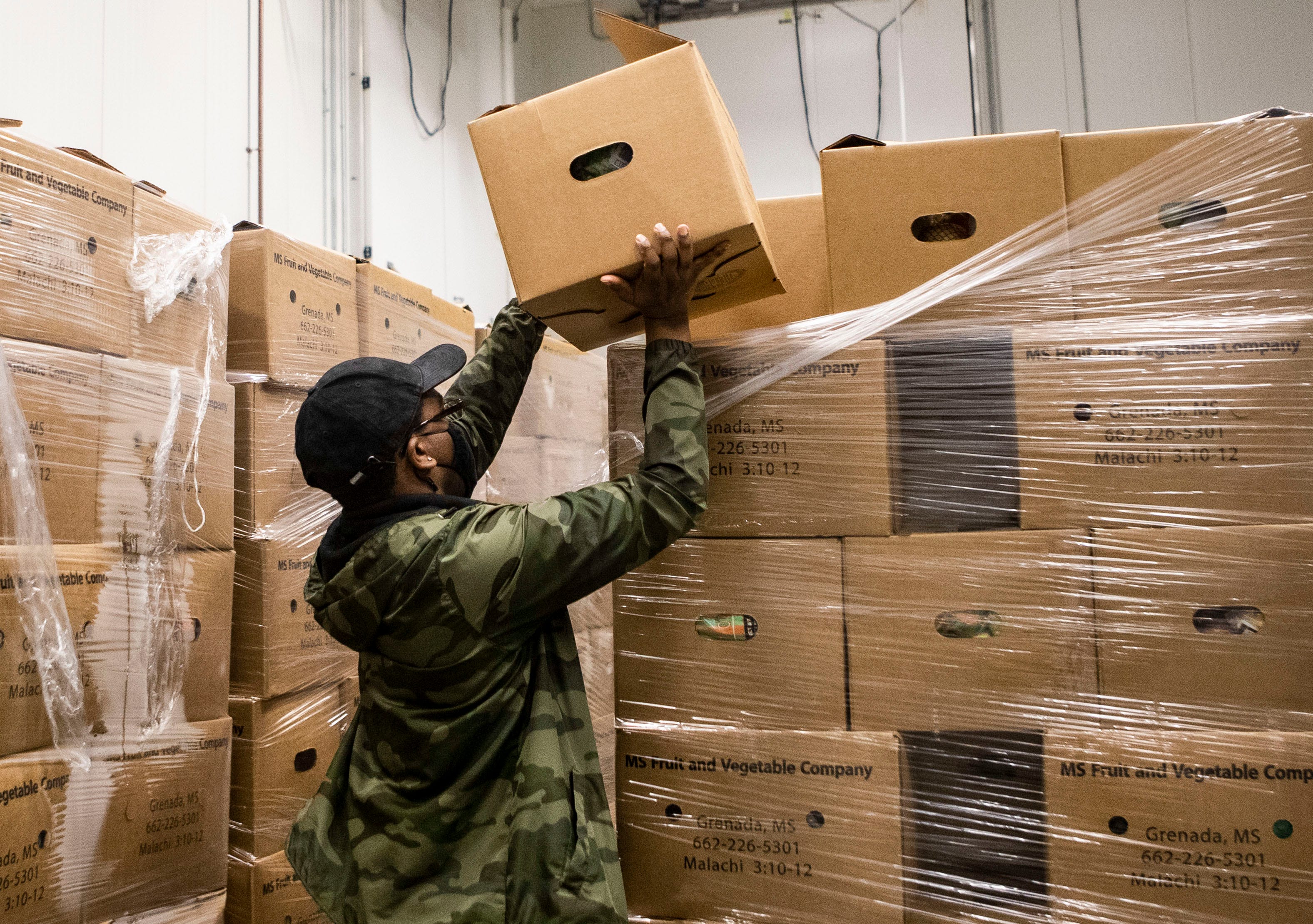
Anthony Walls treads carefully in his steel-toed boots across the Mid-South Food Bank warehouse floor. The warehouse manager eyes the floor, looking for scraps of wood from the hundreds of wooden pallets that bear tons of food. When he sees one, he stoops low to pick it up.
If the wood hits the tire of a forklift, that could mean thousands of dollars in damage. Money that would be better spent on food.
The 24-year-old is responsible for making sure the food that is feeding thousands of needy families across the Mid-South arrives and departs on time.
The warehouse itself is deep in southeast Memphis, along the industrial corridor that is the backbone of the city’s economy and the part of the nation’s indispensable transportation infrastructure.

It’s busy in the warehouse. Every step Walls takes is accompanied by the ceaseless chirp of beeping forklifts in the background. A breeze hits his face as he walks. It’s not the wind. It’s one of the fans affixed to the ceiling that’s the size of a turbine. Without it, the air inside would be stuffy, stuffier still inside the masks Walls wears around his face.
The pandemic has made the days longer for Walls and his employees. The days creep towards 12 hours now. The workweeks extend into the weekend, six, sometimes seven, days a week. Lines for food distribution have stretched for blocks all over the region since the pandemic began and unemployment rates have jumped.
“People need to eat during the weekends as well. We’re in a race against time,” Walls says. The constant marathon of the day doesn’t allow for much reflection as to how his work and those of the other employees are feeding thousands of people who otherwise wouldn’t have it.
“I’ve been so focused lately that I haven’t any recollection of time,” Walls says.

Methodist North
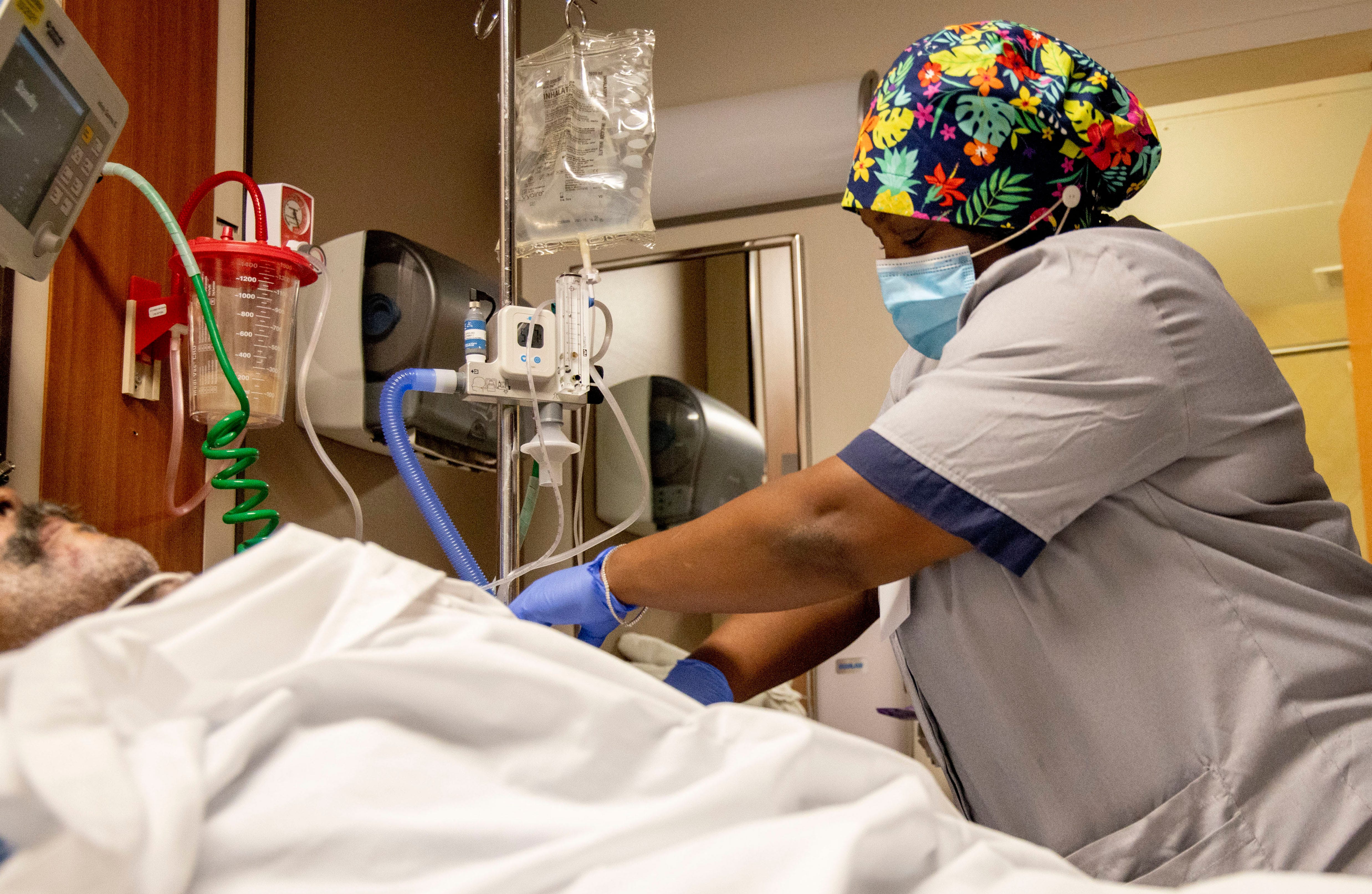
Keisha Thomas has been an attendant at Methodist North Hospital for almost 10 years, and she can clean a patient room top to bottom in 5 minutes.
This morning, she’s cleaning a cardiovascular step-down unit. With her mask secured to a Hawaiian print scrub cap, she knocks on a patient’s door.
“Good morning. How are you?” she asks. “I’m going to clean and sanitize the room for you. Is that OK?”
Thomas asks how the patient liked breakfast and lets a nurse know the patient needed help with her dentures as she moves to the next room.

That’s normal. But plenty has changed since the pandemic began, Thomas says, like the masks required at all times and the additional protective equipment required on COVID-19 floors. Other changes: the number of patients and the pace of work.
“We’ve been holding a lot of people in the ED (emergency department),” she says, a common hospital practice when rooms are not immediately available. “The overflow of patients and discharges ... it’s overwhelming.”
Standing in another patient room, Thomas says COVID-19 has taken over. Working in the hospital, she’s seen people sickened and killed by the virus. She wants Memphians to mask up now so eventually, things can go back to normal, she says.
Then she gets back to work, cleaning the bathroom and mopping the floor before she places a wet floor caution sign at the door and rolls her cart down the hall.
“On to the next,” she says.

The Liberty Bowl
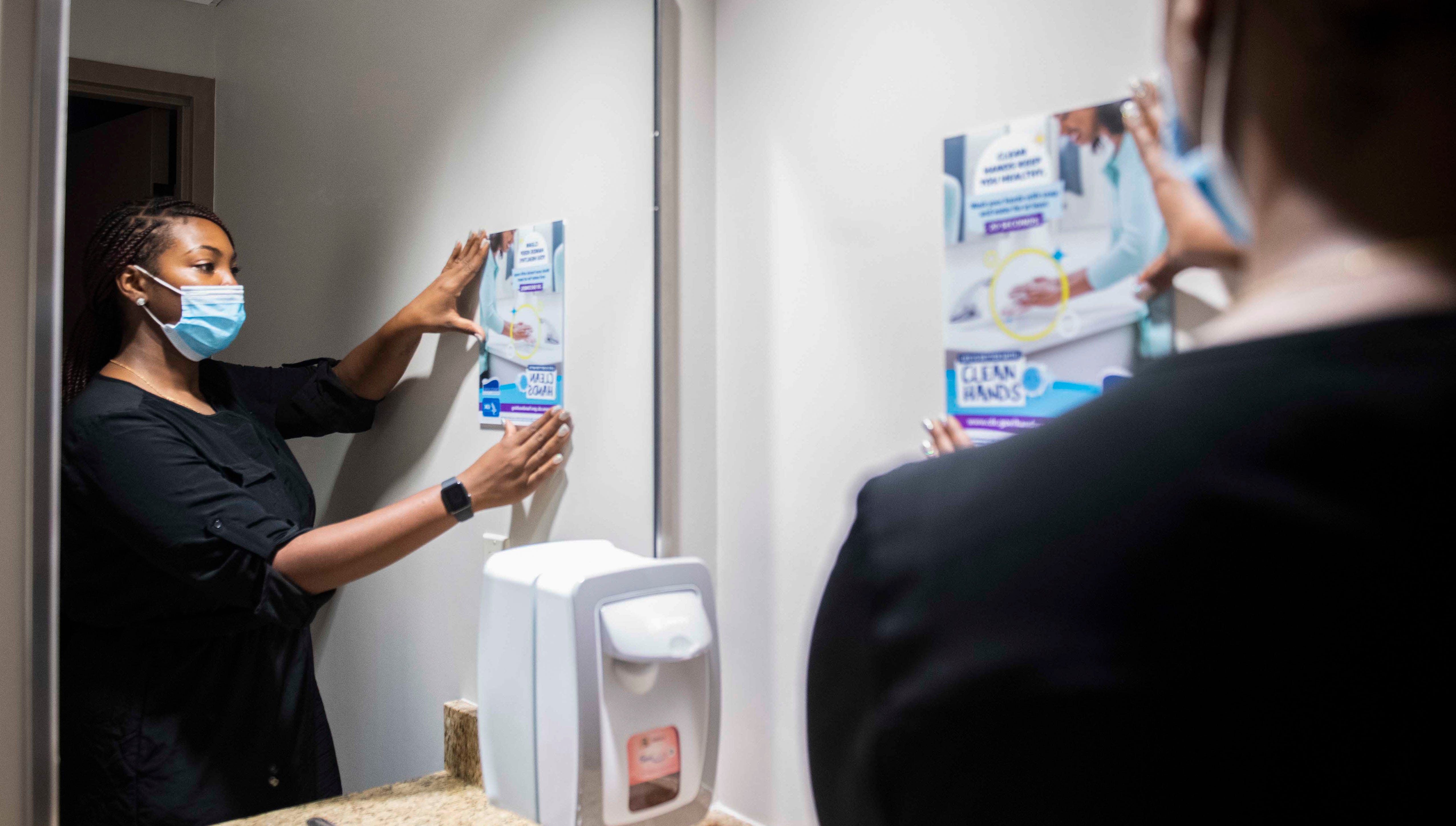
The lobby of the main office inside Liberty Bowl Memorial Stadium is normally spick-and-span.
But just days before its gates open to what will be the largest gathering for a public event in Memphis since March, stacks of instructional signage and boxes of personal protective equipment crowd the area. General manager Thomas Carrier explains getting those materials in place before more than 4,000 people arrive for the University of Memphis football team’s 2020 season opener is but one of myriad tasks left on his itinerary.
Carrier notes he has worked in event management for nearly two decades.
“I haven’t had this feeling in 18 years, when I first started,” he says. “So, there are butterflies.”
While Carrier walks the concourse inside the stadium, he checks in with contractors who are triple-checking the facility’s new HVAC computing system. Event manager Tim Coleman huddles up with representatives from KONE Elevators and Escalators of Memphis. Event services coordinator Brandy Pickett assembles hand sanitizing stations.
Carrier, who will soon be part of a 70-person gameday operations meeting, figures it will take day-and-night efforts to have everything done by Thursday. His afternoon is earmarked for replacing metal barricades with Tensabarrier around the stadium.
“Our (Tensabarrier) rep told me last week the stuff we ordered two months ago might not get there until after the first game,” he says. “I got an email this morning that said the shipment will be here today. So, I just laughed. That’s all you really can do.”

Ave Maria nursing home

Maureen Perkins puts her purse in the flowerbed and taps on the window screen.
"Mom?" she shouts.
The nursing home staff has dressed her mother and she's sitting in a chair in her private room. She doesn't look at the window.
Using a video conferencing device, a staffer inside the room makes a call to the daughter's cellphone. "Hey Mom. Mom?" the daughter says. "Can you hear me?" The mother doesn't respond.
The daughter, now 55, never knows what to expect on these visits. On some days, 89-year-old Maureen Buchman understands there's a pandemic and she's happy to see her daughter through the window.

As times passes, her dementia has worsened. Sometimes she'll see her daughter and struggle to get out of bed on her own, and the daughter screams at her, "Don't! You don't walk!" Other days, she'll ask over and over why her daughter doesn't come inside.
Now, the daughter asks, "Is she asleep?" No, her eyes are open. But she looks dazed.
This nursing home, Ave Maria in Bartlett, hosts videoconferences, drive-thru visits and window visits like this, but it has not allowed contact visits since March. It's had several COVID-19 cases, but so far, no one there has died from the virus, according to the Shelby County Health Department.
Elsewhere in the Memphis area, the virus has killed about 100 nursing home patients, according to the health department.
The mother is in hospice care, and her daughter accepts she will die, but she doesn't want her to catch the coronavirus. "It's a horrible two weeks before death."
She hasn't hugged her mother since March. “The isolation at the end of your life has got to be really hard ... And all these elderly people's cases, they've gotten to their slowdown of life, and no one's allowed to get near them. I think that's sad."
Minutes pass at the window. It becomes clear that today, the mother won't respond.
It's time to go. "Love you, Mom."

Vision Preparatory Charter School
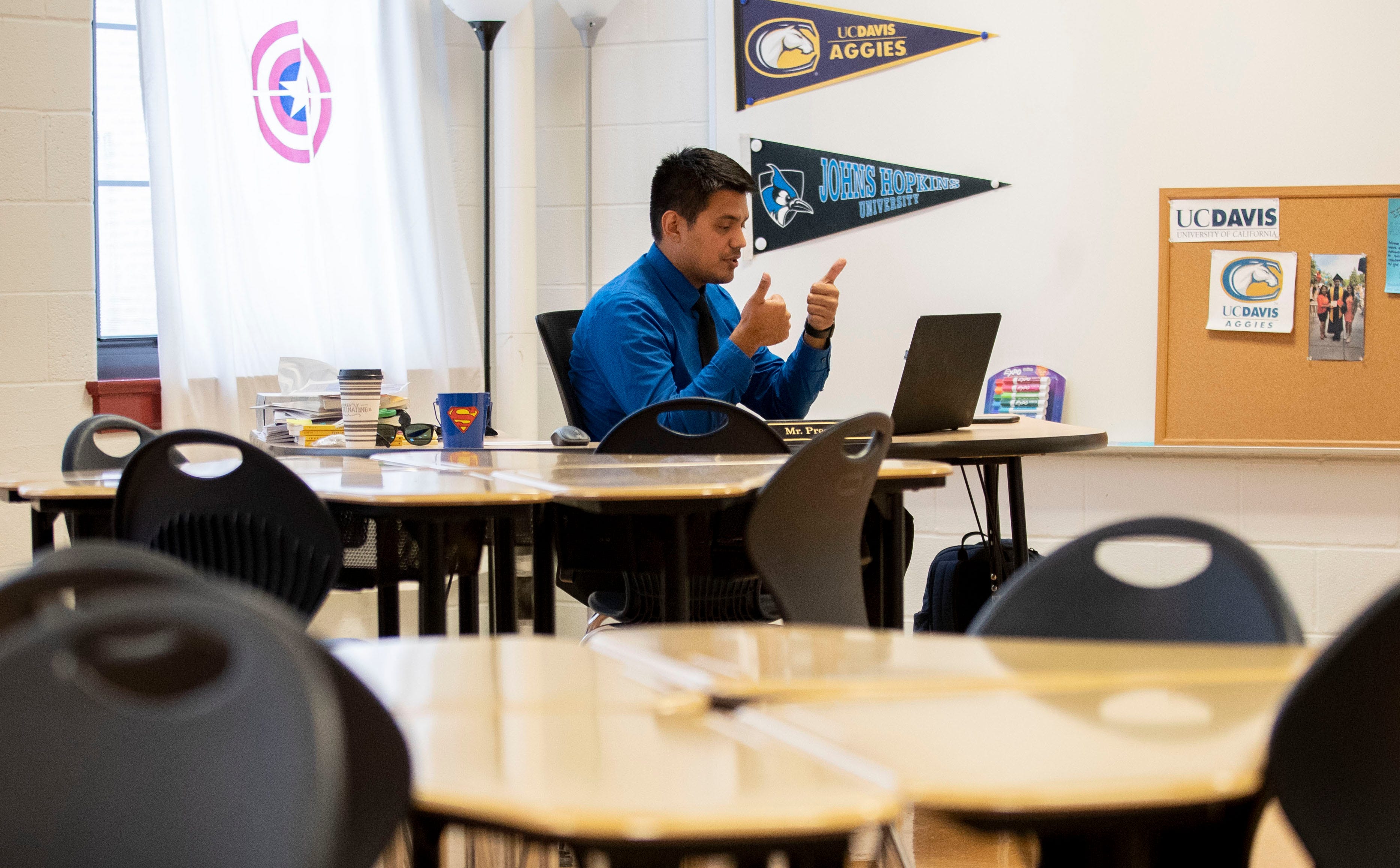
Fidel Prestegui sits surrounded by desks empty of children, a whiteboard empty of lessons and walls empty of student work.
To his right, his color-coded teaching schedule is precise and full. At his left, his phone alarm signals the end of a 10-minute work break, a 5-minute restroom and snack break. His attention is straight ahead, focused on his students — their needs, their questions, their assignments — all packed into the laptop screen in front of him.
Please unmute yourself, please write in complete sentences, please remember to keep your materials, including your laptop charger, at your remote work station. Teaching virtually is, at once, different and the same.
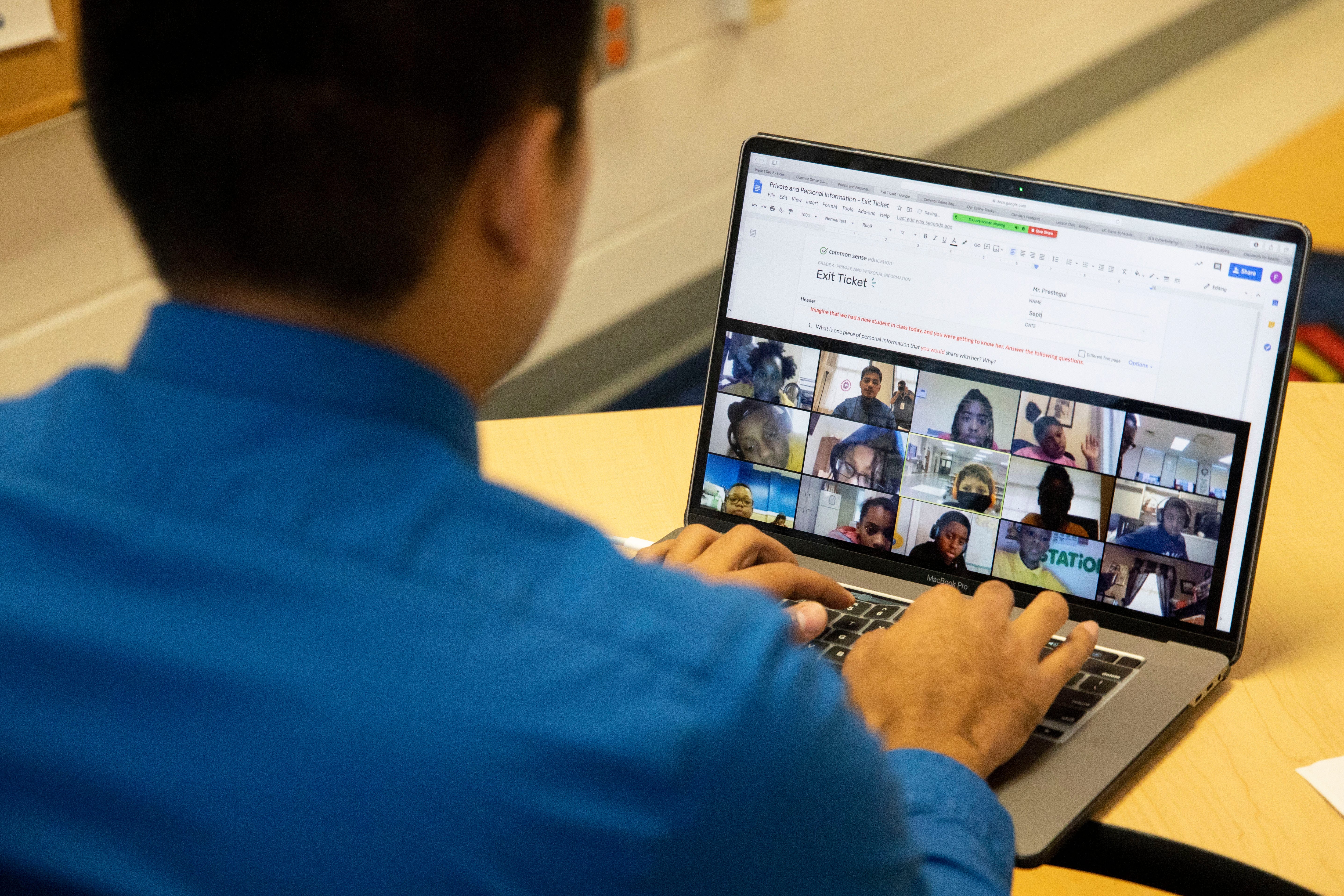
“Mr. Prestegui, it’s still not showing up,” one fourth grader says. He was trying to find the Google Classroom assignment on private and personal information online, a part of the digital citizenship lesson that’s newly important in virtual learning. Though new to this moment, Prestegui thinks the lesson would have had value for students before, too.
“Click refresh on yours,” he instructs. “It should be there.”
A few seconds pass, then the student’s assignment appears.
“There it is. I got it,” he says.
Prestegui teaches fourth grade reading at Vision Preparatory Charter School in South Memphis, where students started school virtually Aug. 31. He goes over his lessons “time and time and time again.” He doesn’t want his lessons to add to the uncertainty COVID-19 has already brought to student’s lives.
“Instead of that, I want to make sure that I’m extremely prepared, even overly prepared,” Prestegui says, “and then making sure that I have even more things planned out so that if my kids come up with a question I’m able to answer it, and the less issues that we have, the better.”

River Oaks
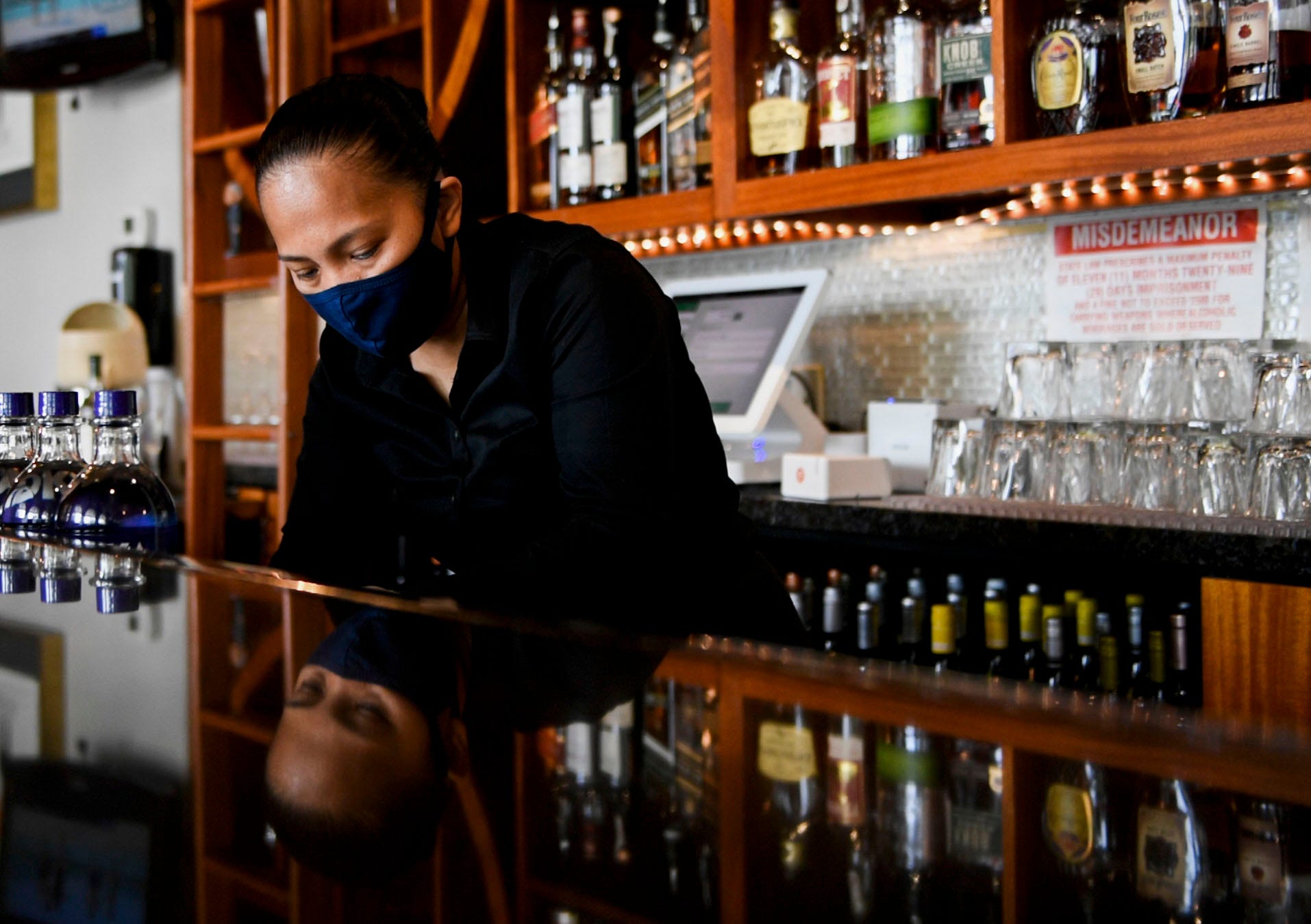
It is business as usual for Joy Chism during the lunch rush at River Oaks. A twinkle in her eyes reveals the smile behind her face mask as she takes care of her customers.
A server at River Oaks for 10 years, Chism is known for her attentive and friendly service.
She will be the first to tell you the restaurant business is different now. As she looks across the dining room, she points out it is only filled to 50% capacity. “I used to take care of 10 tables,” she says. “Today I will only have about four or five.”
Despite having fewer customers, she is busier than ever. “I have to wash my hands or change gloves in between every table visit,” she says, explaining she prefers changing gloves because she can do that quicker.
“Look at the tables. There is nothing pre-set,” she points out. With COVID-19 protocols, nothing is put on the table until it is requested — giving servers like Chism more trips between the table and the kitchen.
Everything is sanitized between customers. “I take the water pitcher back to the dishroom after each time I fill glasses at a table,” she says as she scurries back through the kitchen doors with a water pitcher in hand.
Chism says she is grateful for her customers. “The good thing in all this is that our customers are so generous. They understand the situation and are helping us.”

201 Poplar
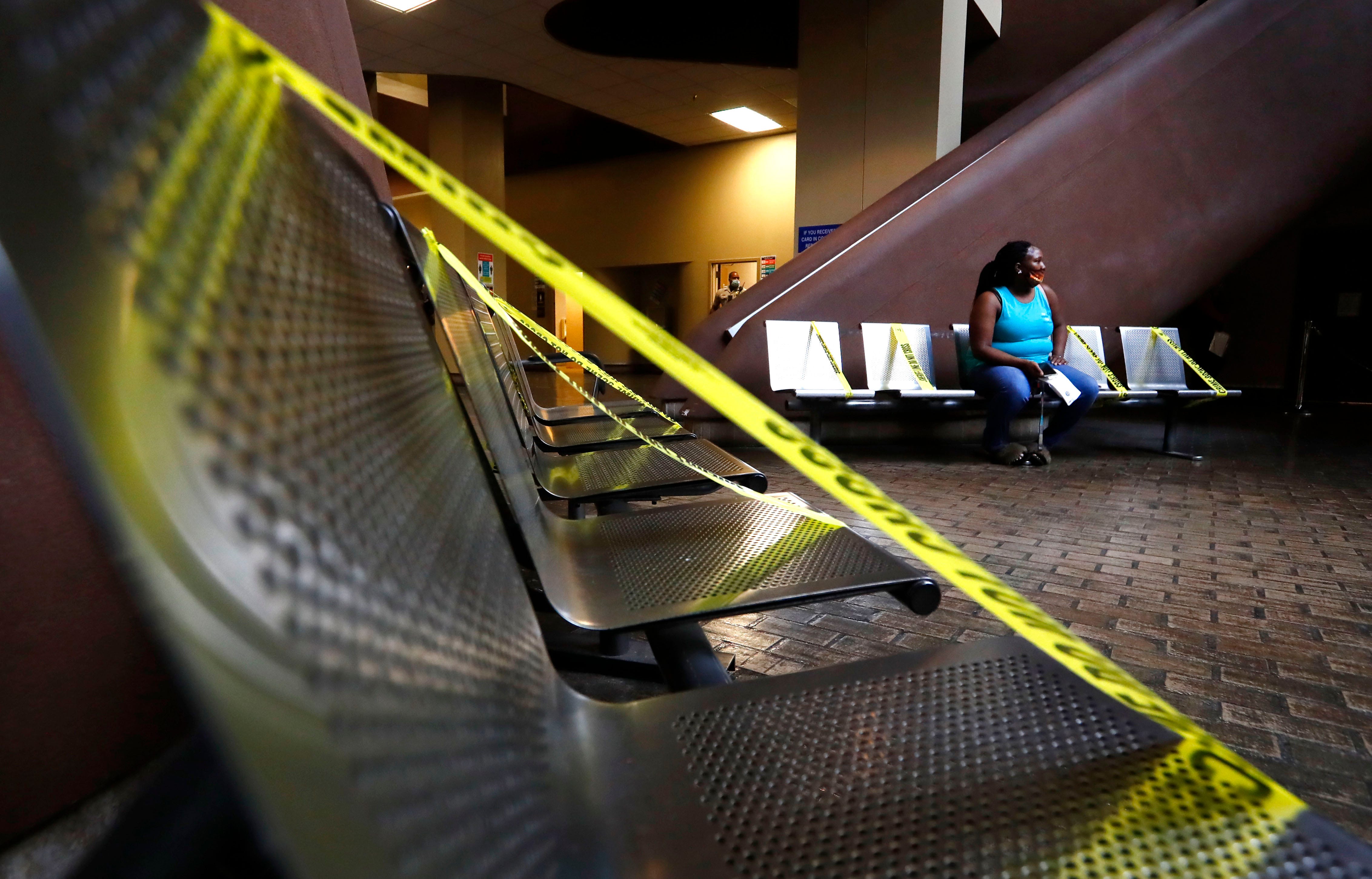
Outside Judge Carolyn Wade Blackett’s courtroom, Nicholas Calvin sits alone.
He's been sequestered from hearing other testimony, a standard practice for witnesses. But the rest of the proceedings in which he took part were far from normal, marked by the ongoing risk of transmission and the increased strain the pandemic has placed on court-involved families.
To be sworn in, the 48-year-old father and car-wash owner faces a laptop on which Judge Blackett appears via video, on a table with plexiglass barriers installed between attorneys.
Lawyer Michael Working asks Calvin how he knew the defendant seated directly in front of him, close enough that the pair could have touched.
“I’m his father,” says Calvin, in a hearing that seeks to lower a $500,000 bond.
It’s been more than four years since Calvin brought his then-15-year-old son Yamar to a station to speak with police. Throughout that time, the younger Calvin, his family and lawyers have maintained his innocence in the murder of which he is accused — and awaits trial indefinitely.
Amid the pandemic, his trial date has been rescheduled multiple times, Working tells the judge. And now with a July order suspending jury trials until further notice, Yamar Calvin, now 20, will be in jail indefinitely, unless his bond is lowered to a figure the family can afford, Working argues.
“There is no end in sight," he says. The vast majority of more than 2,000 detainees at the county's main jail Downtown are similarly yet to be convicted.
After testifying, Nicholas Calvin rejoins his longtime partner, Yakia Owsley, who smiles and waves when her son first entered the room, no longer bearing the baby face of his mug shot. But as Blackett listed a litany of reasons against reducing the bond to $50,000-$75,000 as requested, Owsley walks out distraught.
Blackett did ultimately lower it — to $250,0000. “If they really want him out, they’ll find a way to get him out,” she says.
Taking the elevator down, the elder Calvin begins hatching plans to raise the money. “I just want my son back,” he says.

R Bernard Funeral Services
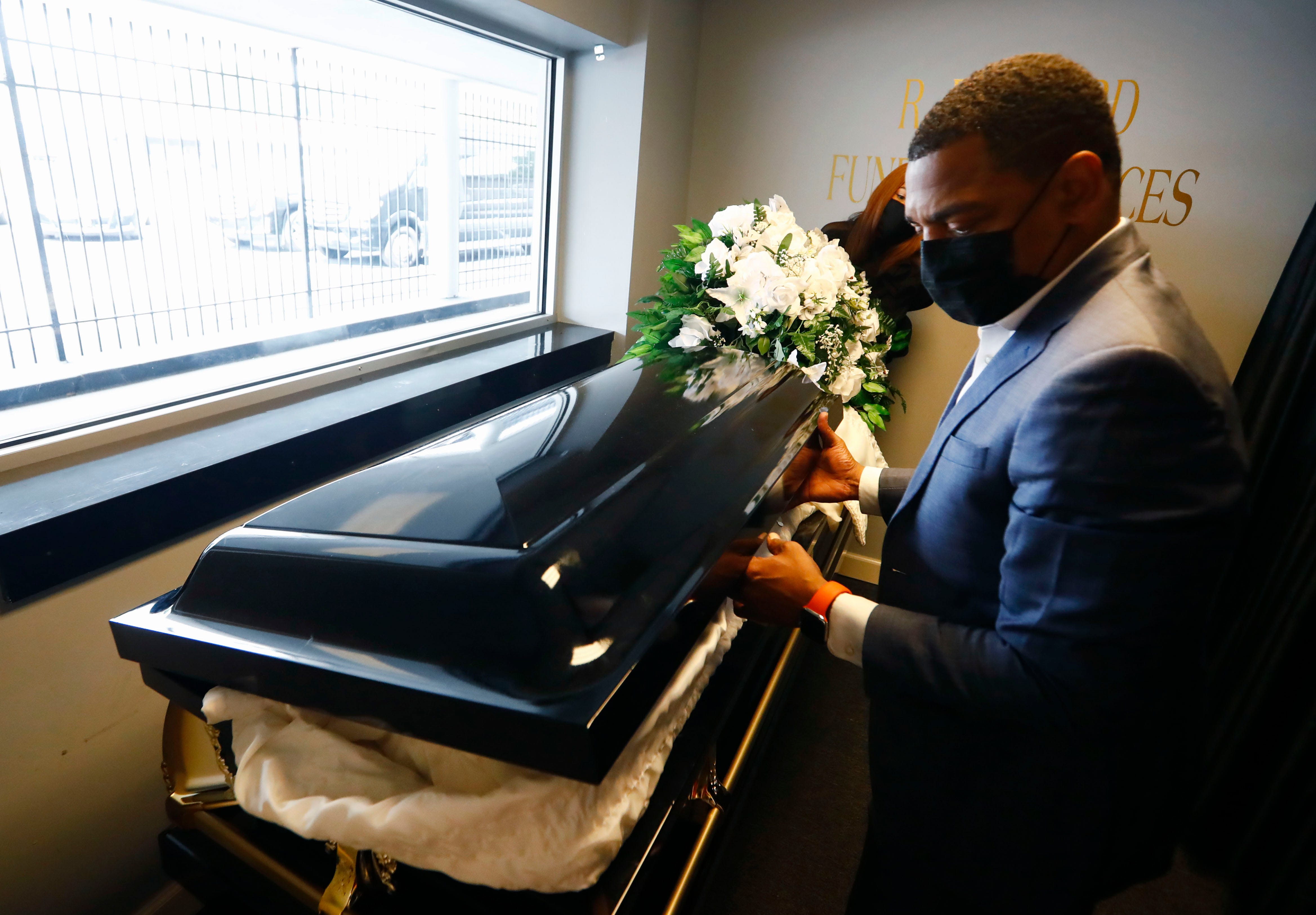
There’s a picture of a monkey hanging on the wall, a cigarette inexplicably stuck behind its ear at R Bernard Funeral Services. Visitors have likened the space, outfitted with plush chairs of rich and metallic tones, to a furniture store. The back wall is mirrored, multiplying the silver and gold chairs.
Those are just some of the personal details inside the funeral home that families no longer get to see, as COVID-19 keeps them outdoors.
But the funeral home also has another unique detail: A drive-thru viewing option, left over from when the building was a bank.
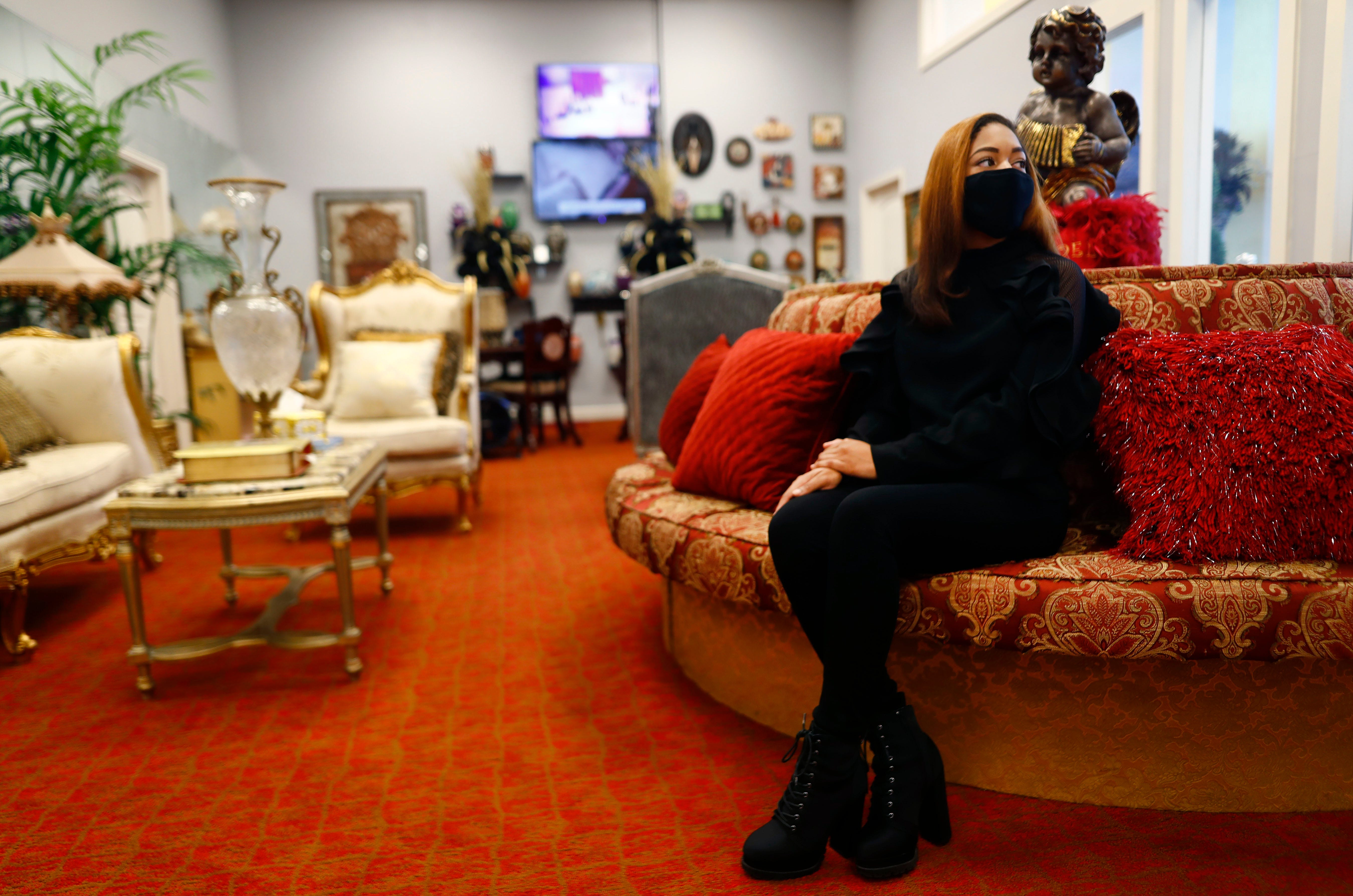
When Ryan Bernard opened the funeral home in 2017, hoping to offer families the personal experience he wished he’d had when his aunt passed away, the drive-thru was a bit of a joke. Today, it’s become an essential part of the services offered during the COVID-19 pandemic.
“It’s hard. It’s very difficult. I just want to hug (the families), because I sympathize with them,” says Deja Bernard, Ryan Bernard’s daughter and assistant. “With them having COVID-19, they’re already in a hospital for so long and (the families) can’t be there with them and they can’t see them and can’t touch them. Their first time seeing their loved one is here.”
Outside, the home is unsuspecting to drivers down Lamar Avenue, except, perhaps, when a drive-thru funeral has traffic backed up around the block as loved ones drive past windows displaying the recently deceased among a room showing the person's favorite things through personalized flower displays.
“You have to cater, you know, like I learned in school, the family members are going through the five stages of grief and you never know which stage they’re going to come to you with," Ryan Bernard says.

School-at-home in Parkway Village
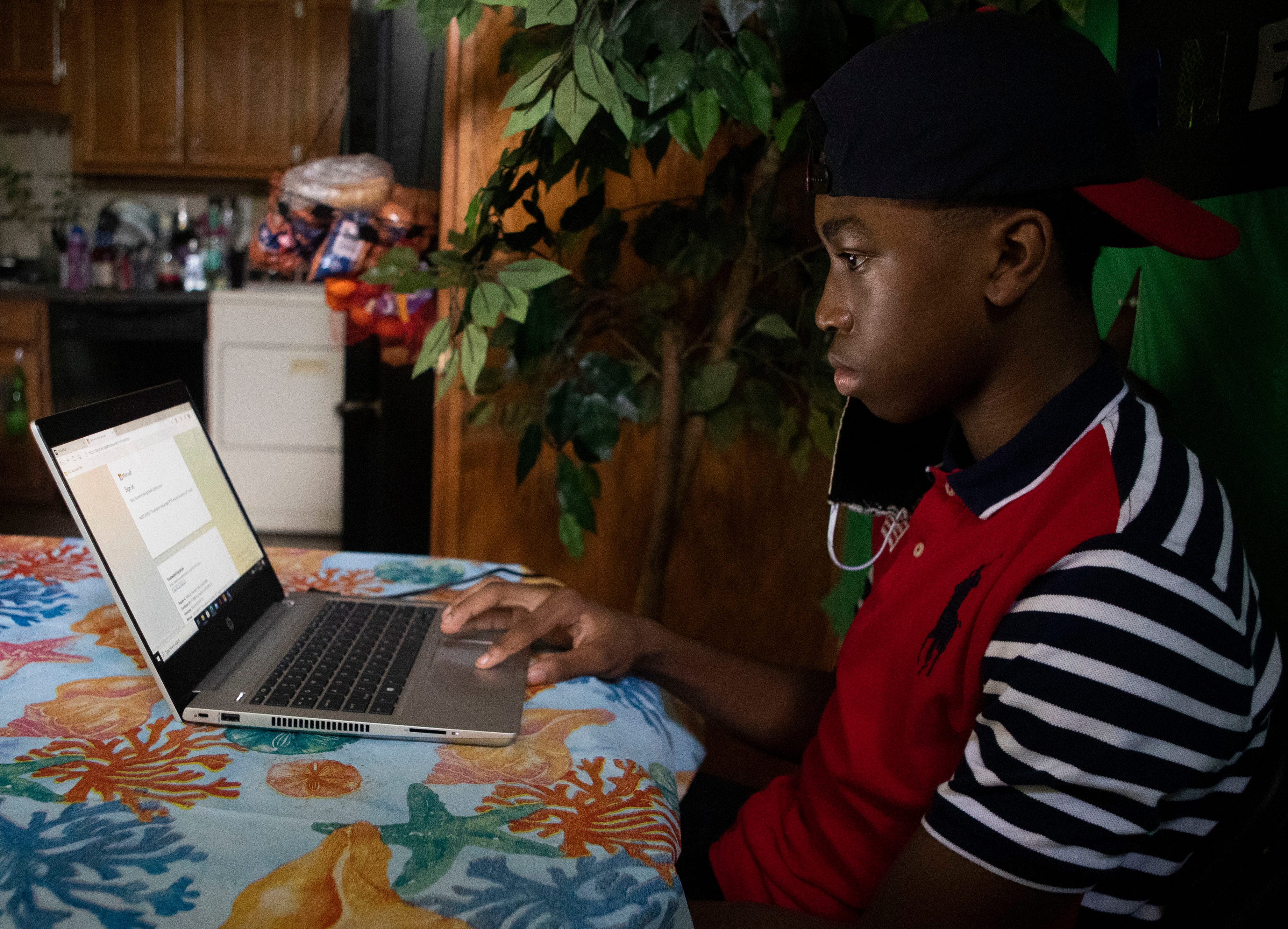
It’s the second day of virtual school, and Ophelia Jones’ air conditioning is taking a break.
But her son, 14-year-old Emerson Tenner, pays little attention to the indoor swelter and much attention to his laptop, where instructors are walking him through lessons on algebra and world history.
Above Emerson’s workspace is the welcome-back-to-school message that he might normally see in a corridor at Cordova High School, but one that Ophelia made especially for him; to recreate some of the normalcy that the COVID-19 pandemic continues to strip away.
Against a green crepe paper backdrop, “Happy Virtual Learning Emerson,” is spelled out in block letters.
“Emerson is a ninth grader in high school, and he’s a very eager learner, very athletic and very determined,” says Jones, sporting a mask designed with images of former first lady Michelle Obama.
“At first, I thought he was going to have to pick up the concept of working virtually and learning, but that hasn’t been the case.
“He was on the computer before I got up this morning.”
Emerson, a 5’9" basketball player, peers at the screen, unbothered — or resisting the urge to be bothered — by the whirring and buzzing of a clothes dryer which, unlike the air conditioning, is working all too well.
“I really like it. It teaches you how to be responsible,” Emerson says of his virtual schooling. “I thought it would be a little weird to not be in school in person, but then I thought that it would help me to adjust to new things.”
Jones, who is 38, puts in work cheering her children on. She glows as she talks about her dreams for Emerson and her 18-year-old daughter, Kanecia, who received a full-ride scholarship to Tennessee State University.
“I thank God for them,” she says.

Electraphonic Recording
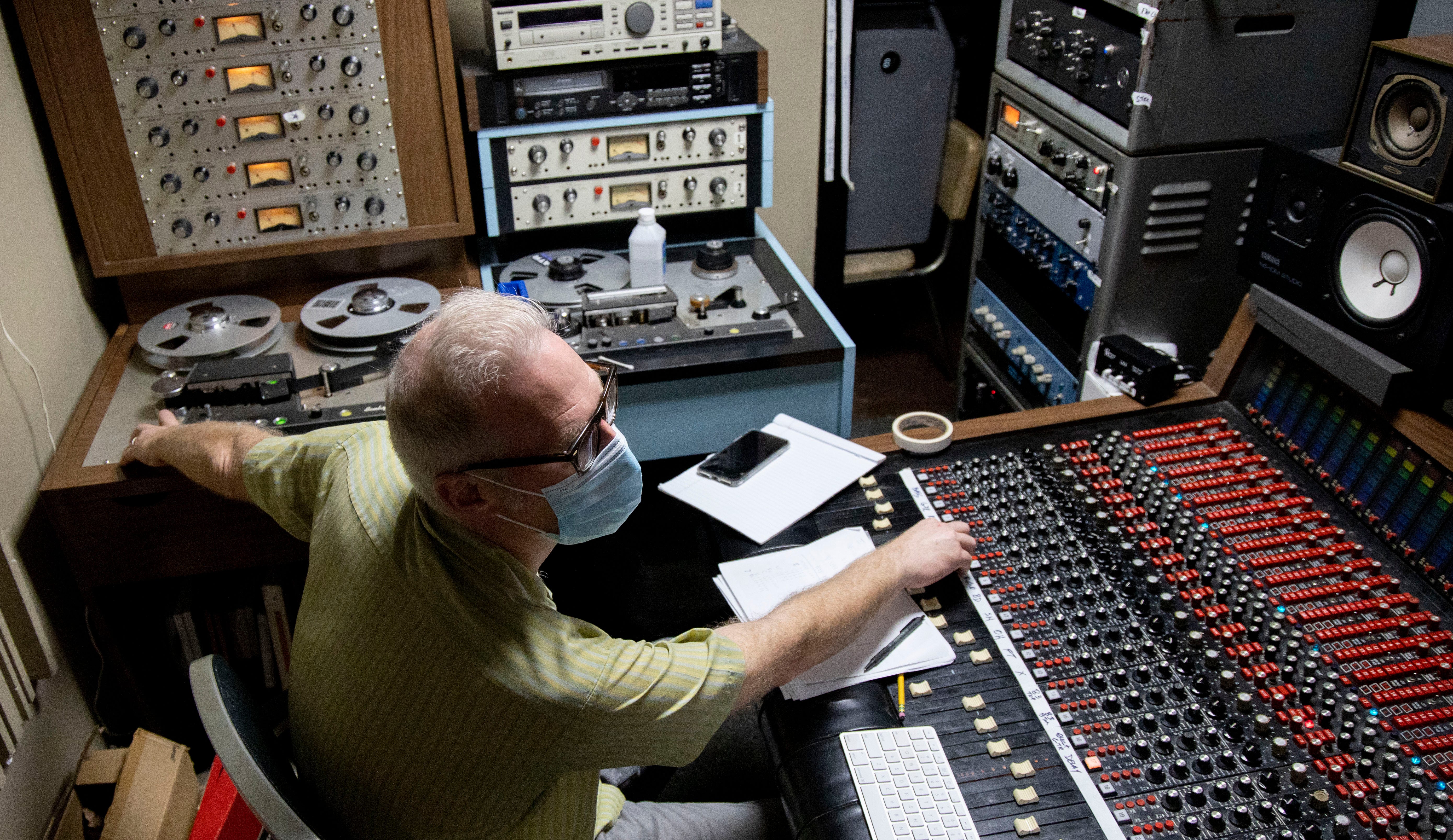
The halls of Scott Bomar’s Electraphonic Recording studio reverberate with a noise that hasn’t been heard in months: the sound of music.
Sitting behind the console of his South Main digs, the silver-haired Bomar is tracking a harmonica overdub for a new album by the Reigning Sound. It’s the first project the 46-year-old Grammy-nominated engineer/producer has done since the start of the COVID-19 pandemic.
“It’s been nice to have something to throw myself into after not being able to work or be around music at all for the last five or six months,” Bomar says.

For Bomar — who, in addition to operating Electraphonic, is the bandleader of retro R&B outfit The Bo-Keys and a noted film composer for “Hustle and Flow” and “My Name is Dolomite” — the return to studio work is particularly meaningful as it’s with the classic lineup of Memphis garage-soul band the Reigning Sound and its leader Greg Cartwright.
Bomar got his start playing with Cartwright’s earlier combos like the Compulsive Gamblers and Tip Tops in the '90s. “If it were not for meeting Greg at a young age, I may not have even gotten into music the way I have,” says Bomar.
The conditions for this session are different. Everyone is masked, including Bomar. “I decided on the front end that, despite what anybody else in the band did, I was going to wear a mask the whole time,” he says. As it turns out, the masks have mostly stayed on throughout the process, occasionally even during the recording of vocals.
As Bomar wraps up the last of the project’s overdubs, he and the band will shift to the mixing stage and complete the project by the end of the week. The Reigning Sound record is tentatively slated for a 2021 release and Bomar hopes it’s the first signs of a return to normalcy in his business.

Alrahmah Mediterranean Grocery
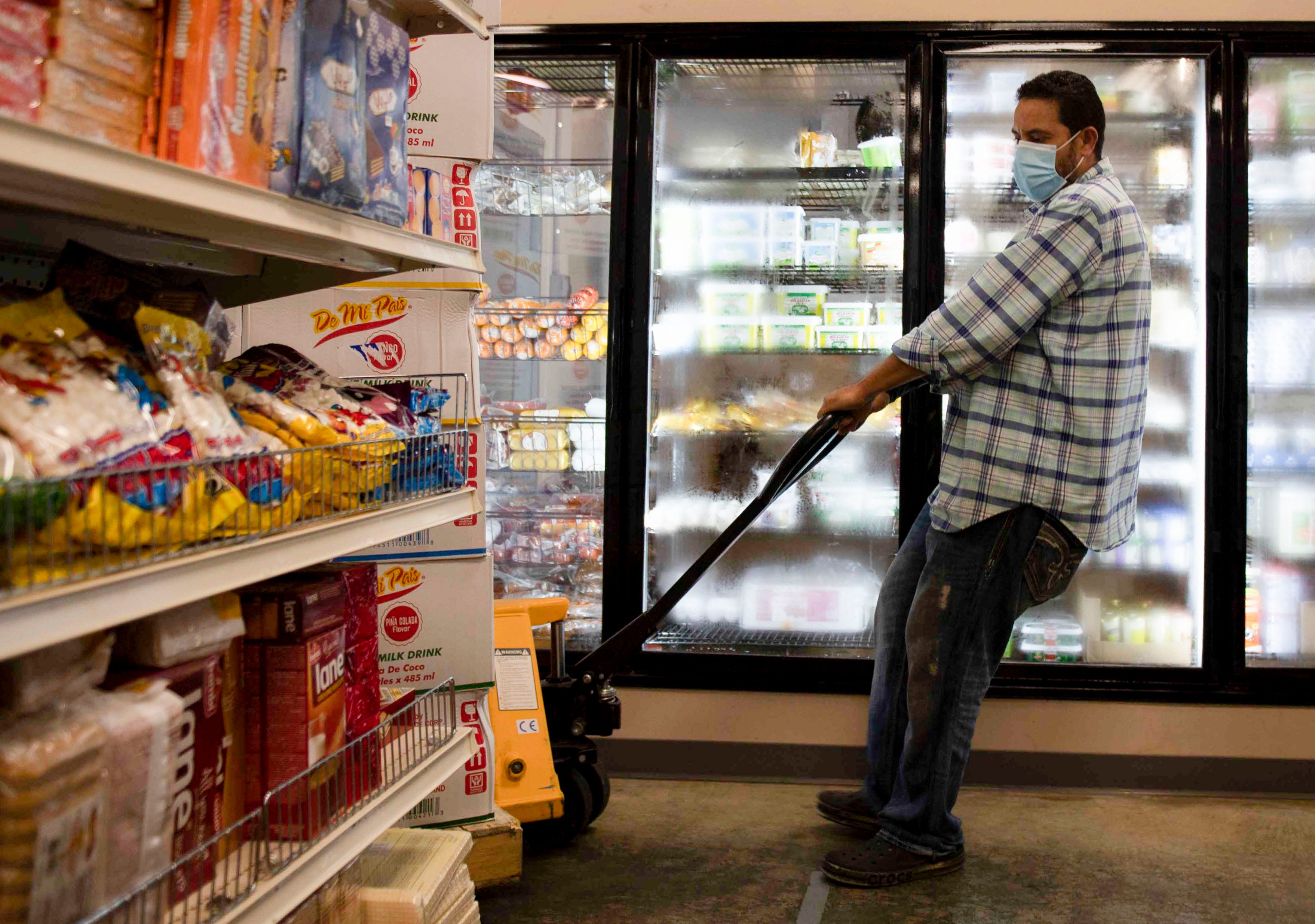
Tamer Eldahan and Saida Laabidi have sold groceries for about 12 years at Alrahmah Mediterranean Grocery in Cordova. During the COVID-19 pandemic, they've continued to provide for their community although they've had to make some adjustments.
This afternoon, Eldahan drags a pallet jack stacked with boxes of De Mi Pais coconut milk while Laabidi describes the zaatar pastries to a customer over the phone. They both adjust their face masks every few minutes.
“As-salamu alaykum,” says Eldahan, greeting each customer he sees in Arabic. (It translates to “peace be unto you.”)
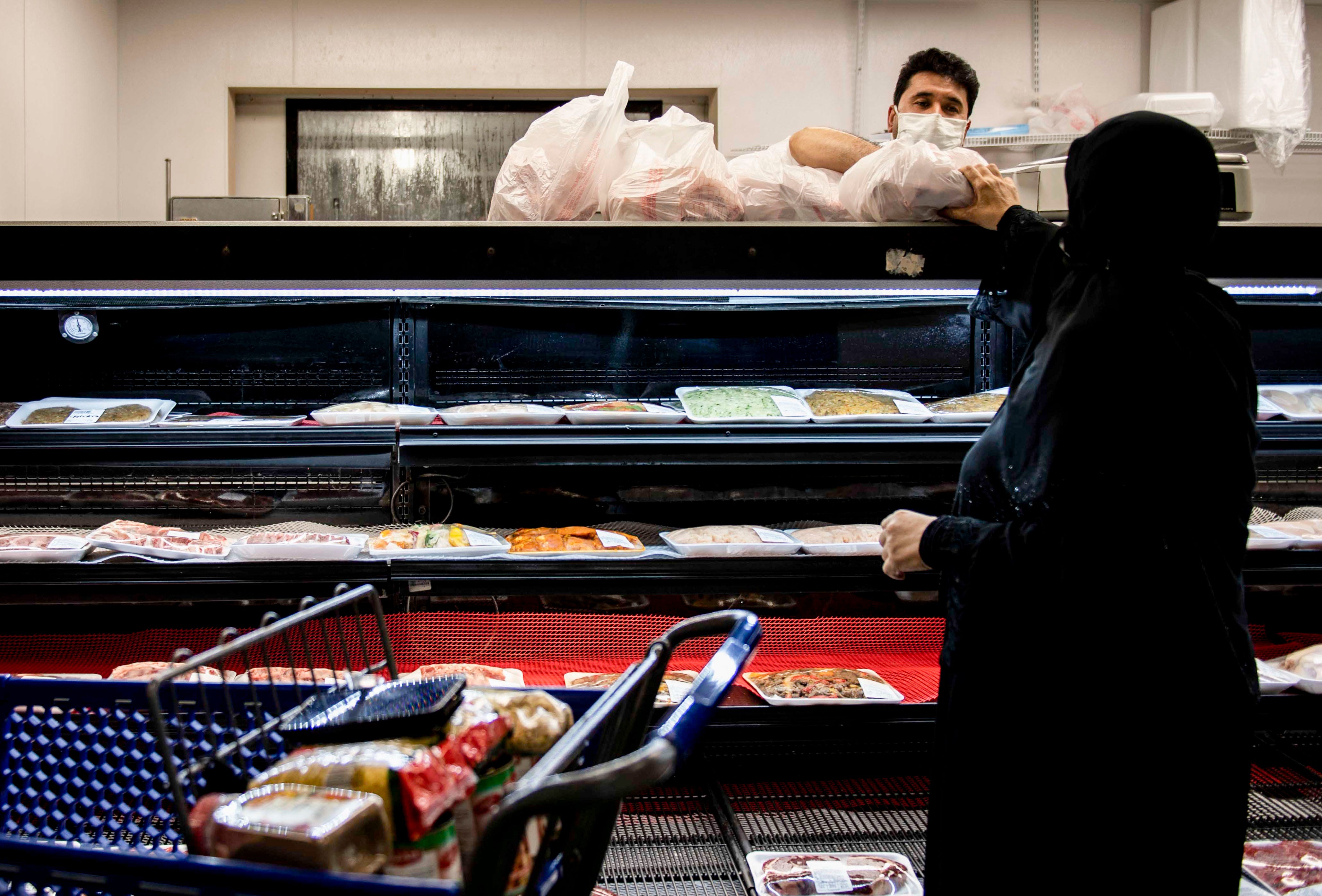
He walks around the store putting spice bottles and tea boxes back on shelves. Then he makes sure the produce is stocked.
Eldahan says the routine stays the same, but since March the store enforces social distancing, mask wearing and stricter cleaning measures. Ordering grocery items is also not the same now as it was before COVID-19.
He says before March, he could buy any amount of items from a supplier, but during the pandemic he is limited to five boxes per item.
“I have to find my stuff for my people,” he says. “It’s more work for me, but I have to go find another company that sells the same quality product to make the normal setup here.”
Behind the cashier desk, Eldahan sets out disposable face masks and hand sanitizer for customers to use.
“From Alrahmah Bakery to everyone in Memphis, please stay safe and wear a mask to help us,” he says.

Willow Park

After the bottles of hand sanitizer were set out and forehead thermometers readied, a line of cars begins winding through Willow Park.
The kids’ bright orange football helmets are spotted first, seen bobbing over the dashboards of cars, driven by parents. Doors flung open and occupants hopped out and scrambled up to a volunteer who would take their temperature, then send them on their way to the field for a muggy, late-afternoon practice.
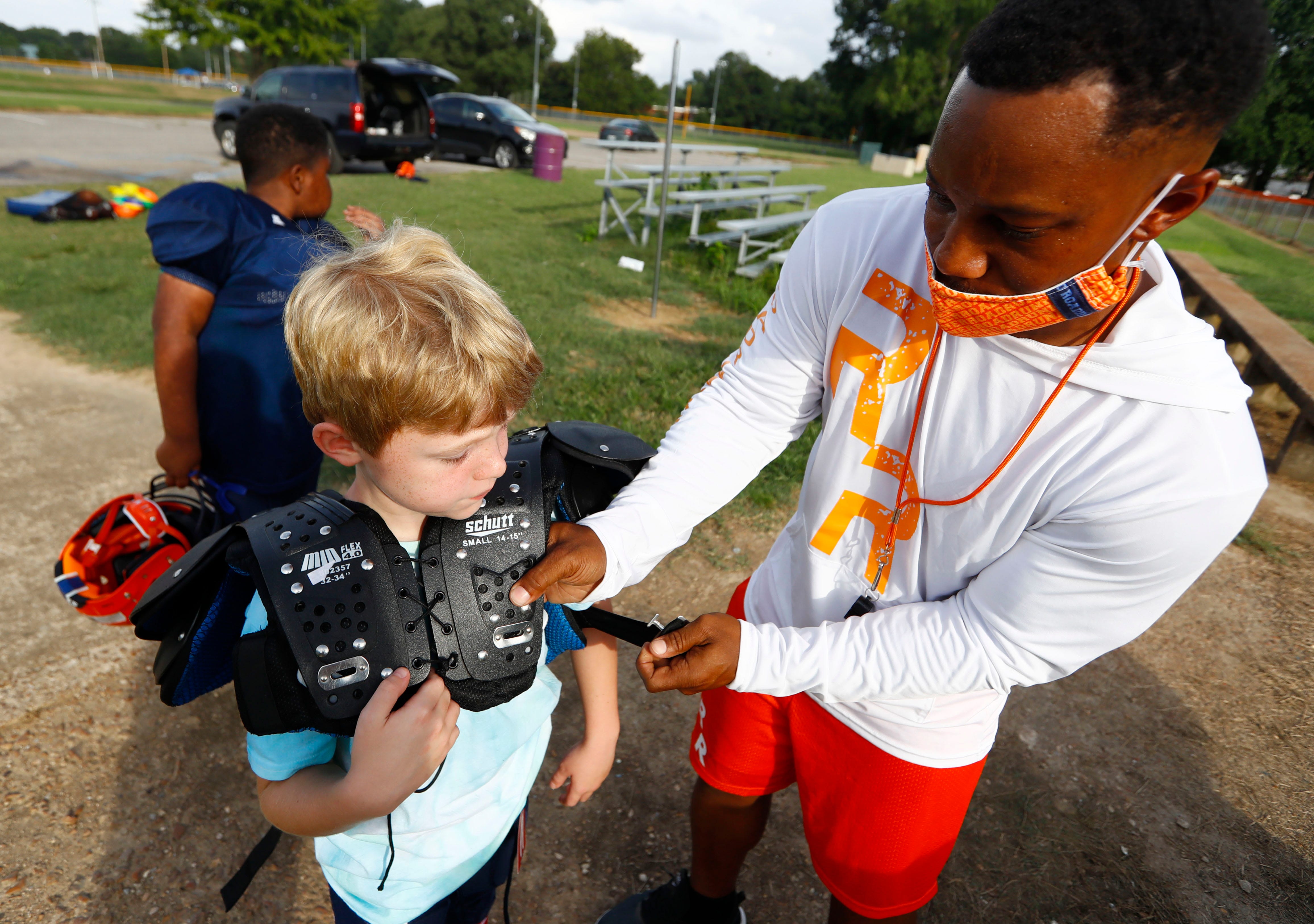
The Mt. Moriah Road Runners are one of the teams that comprise the Sheriff’s and Police Activities League of Memphis and Shelby County. And Officer Antoine Smith, the community engagement officer at the Mt. Moriah precinct, is one of the coaches in the PALs league.
“My goal isn’t about the wins and the losses,” Smith says. “It’s about what they show up with on the first day and leave with on the last day.”
Community engagement hasn’t been easy during the pandemic, Smith notes. And many of the 1,000 or so kids participating in the PALs league aren’t yet back in a physical classroom among friends.
The tackle and flag football and cheerleading team practices have been a balm for Shelby County kids with a six-month-long case of cabin fever.
“A lot of them have been stuck in the house since COVID started,” Smith says. “So, this is that time they have been able to get back outside and start acting like a kid again.”

KIPP football practice
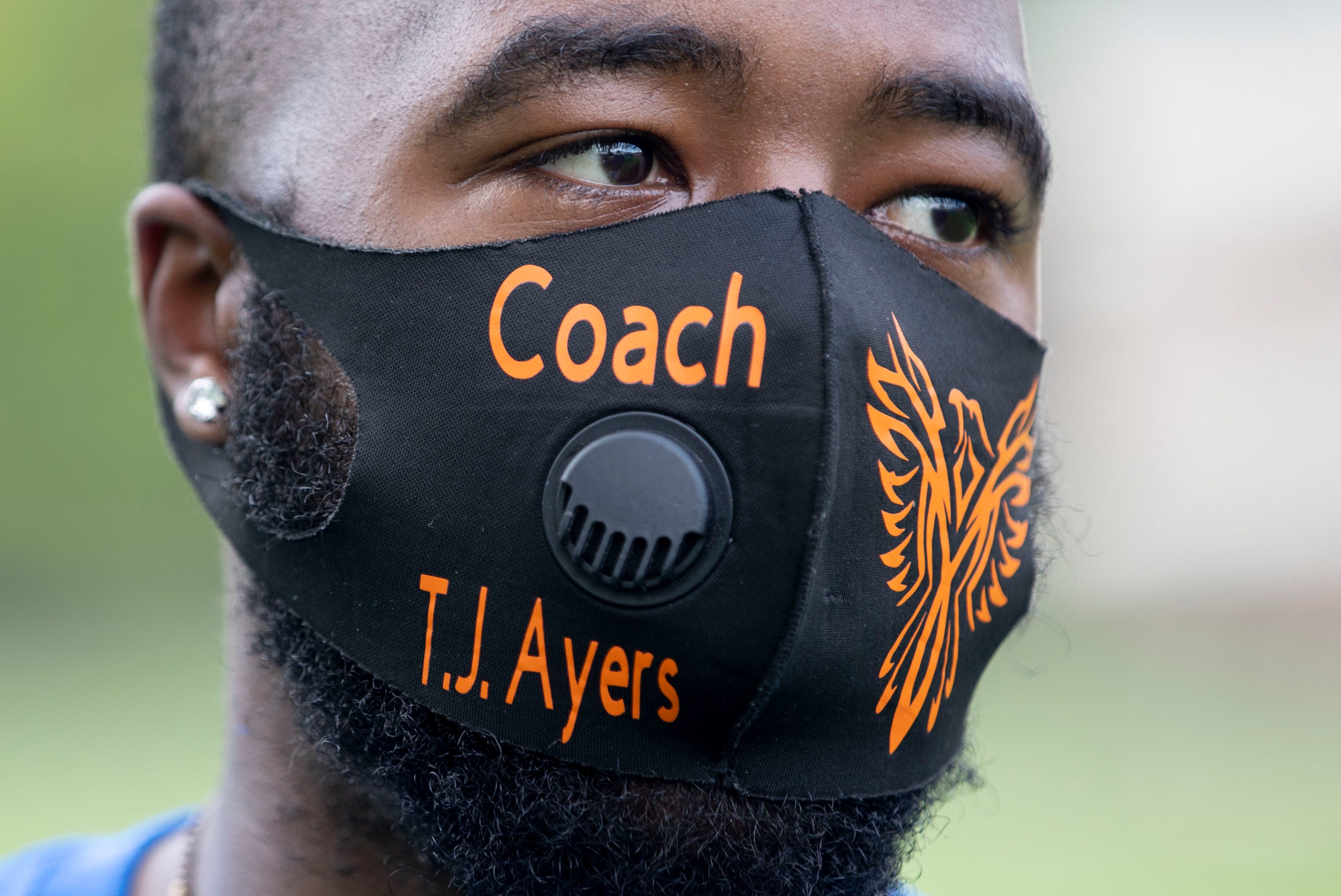
Terrance Ayers stands with his hands on his knees, with a necklace dangling over his blue shirt with orange letters and his face covered by a custom mask that read "Coach TJ." His players are dressed in shorts, T-shirts and cleats because under Shelby County Schools' guidelines they aren't allowed to practice with helmets or shoulder pads yet.
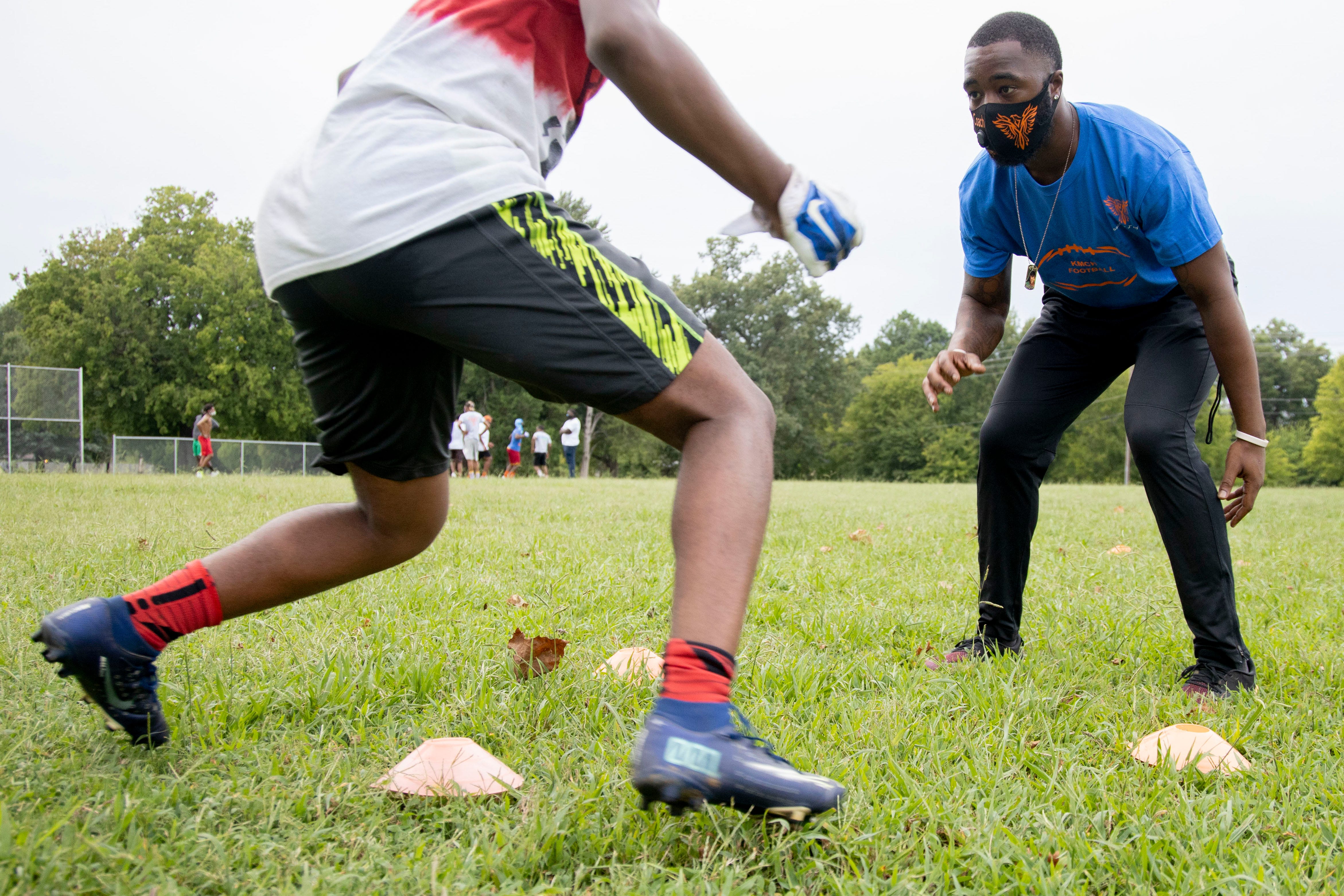
Local suburban and private schools, such as Houston High and Christian Brothers, started playing games on Aug. 21st. KIPP Collegiate and the other SCS schools could start playing games later this month.
But about a dozen or so dedicated players and a pair of assistants show up on this gray, cloudy evening anyway. Because any hope of playing the sport they love is worth it, even though all they can do is non-contact drills like running laps and practicing footwork with cone drills in the grassy field behind their school.
The 27-year old coach, who is one of the youngest in Shelby County and in his second year leading the program, is navigating the kids through the uncertainty of a pandemic. While he is anxious to find out whether KIPP can play, he is embracing this time as a chance to focus on building the program his way, step by step. It's a chance to learn, grow and focus on the fundamentals.
"Nobody is out here guarding you or nothing," the former Mitchell quarterback tells his receivers as they practice running routes. "It should be perfect every time.'"

Pete & Sam's
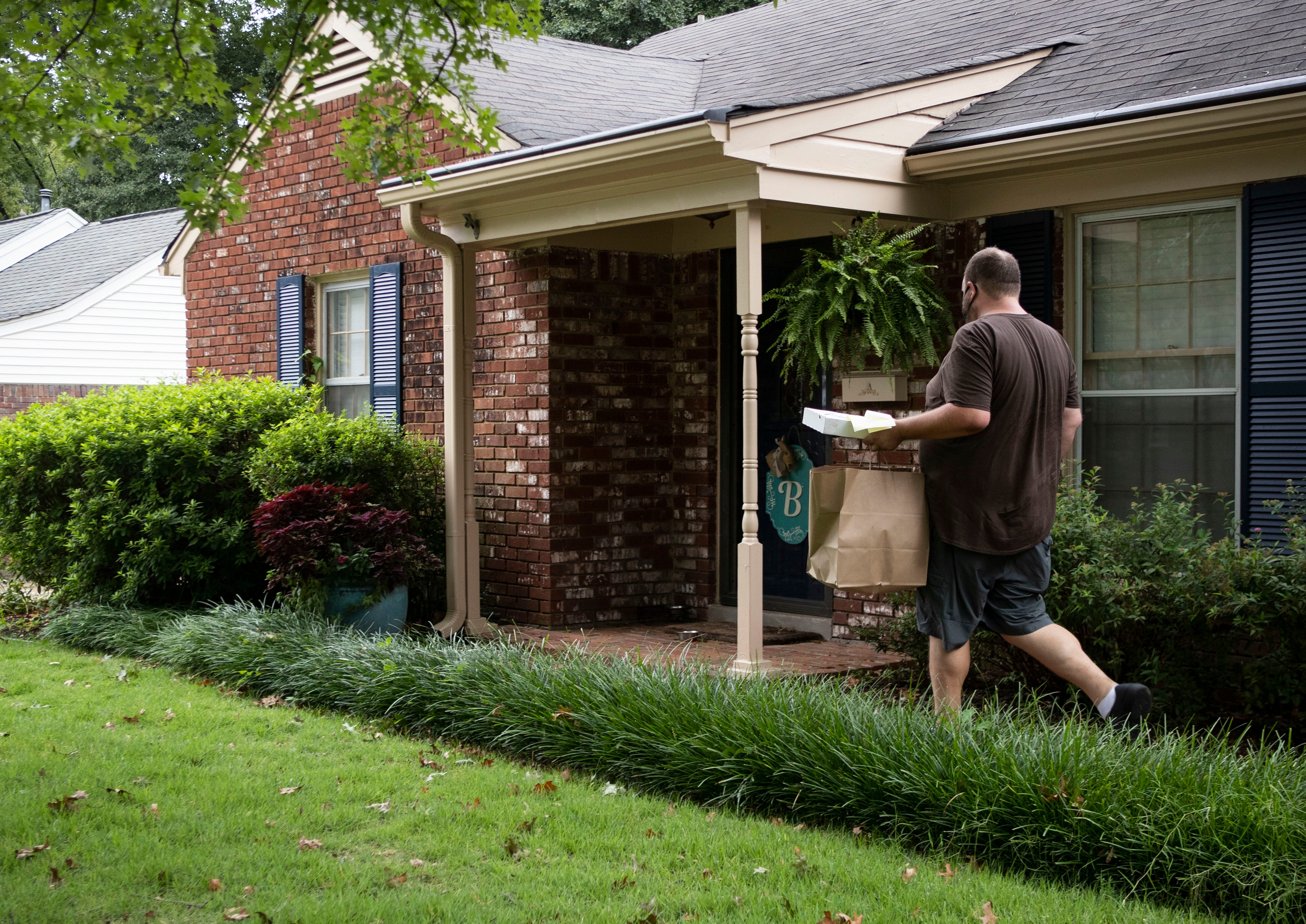
It’s the start of the dinnertime peak, and Hunter Burks is transporting food to hungry Pete & Sam’s patrons. He did this before COVID-19 hit Memphis, but now many of his tables are outside the confines of the Italian restaurant on Park Avenue.
Pete & Sam’s began in-house deliveries in March, allowing servers like Burks to still work during the early stages of the pandemic. Burks says the transition to delivery driver was easy — he already drives for Uber and Lyft. Plus, the dress code is more relaxed.
“With this, you get to wear shorts and a short-sleeve shirt,” the 20-year restaurant veteran says, driving as his Waze navigation app chirps directions.
Delivering meals to homes is a more isolated job than taking orders, serving food and picking up plates and utensils just used. It’s not entirely solitary, though.
Among the meals Burks delivered this evening, he caught up with a handful of regulars, now eating their pizza, pasta, steak and seafood at home rather than at the restaurant.
Still, Burks remains cautious on his route. His fiancée was on a ventilator for 11½ days in June 2019, well before COVID-19. The doctors said she had pneumonia that brought on an asthma attack, according to Burks.
“If I got it and brought it home, it would be a death sentence for her,” Burks said. “At the same time, she can’t be out there working during it. So, if I’m not, how are we going to live? It’s risky.”

Malco Summer Quartet Drive-In
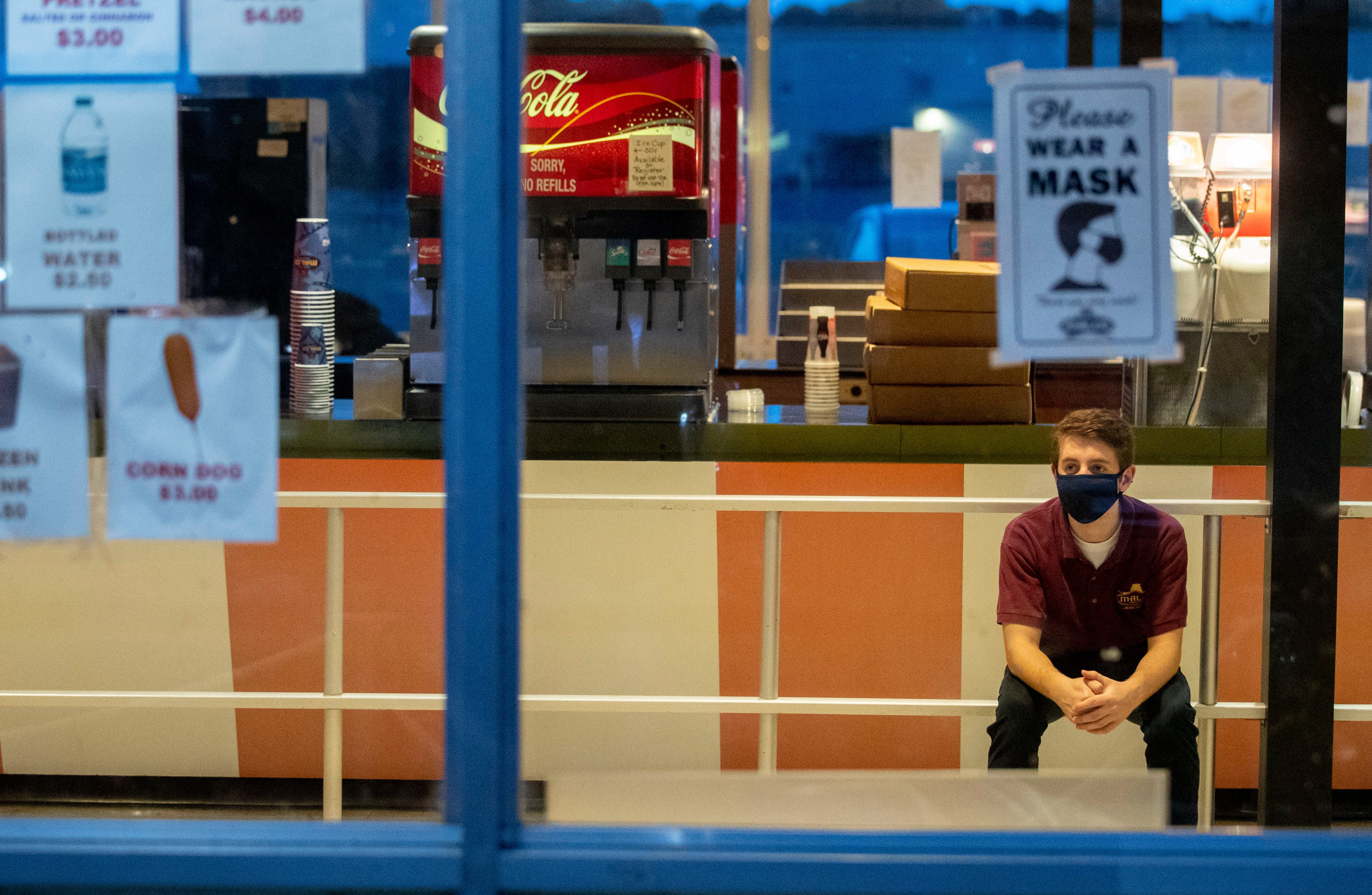
At 7 p.m., the first few cars make their way past the toll booth-like box office and onto the ridged parking lots that face the four screens of the Malco Summer Quartet Drive-In.
Those “first few” will not multiply beyond “a few more.” It’s a traditionally slow Tuesday night, and the forecast calls for thunderstorms — not ideal weather for watching a movie on an outdoor screen from inside your automobile.
Nevertheless, Molly Peters, the drive-in’s supervisor of concessions, is at the grill. She’s sizzling up the first batch of cheeseburgers, to prepare for whatever hungry moviegoers are attracted by a menu that includes hot dogs, corn dogs, pizza, nachos, chicken tenders, popcorn, pretzels, candy, soft drinks and beer, to complement a movie menu that consists of “The New Mutants,” “Unhinged” and “Bill & Ted Face the Music,” along with the promise of an evening of reliable entertainment in an environment socially distanced by its very premise.
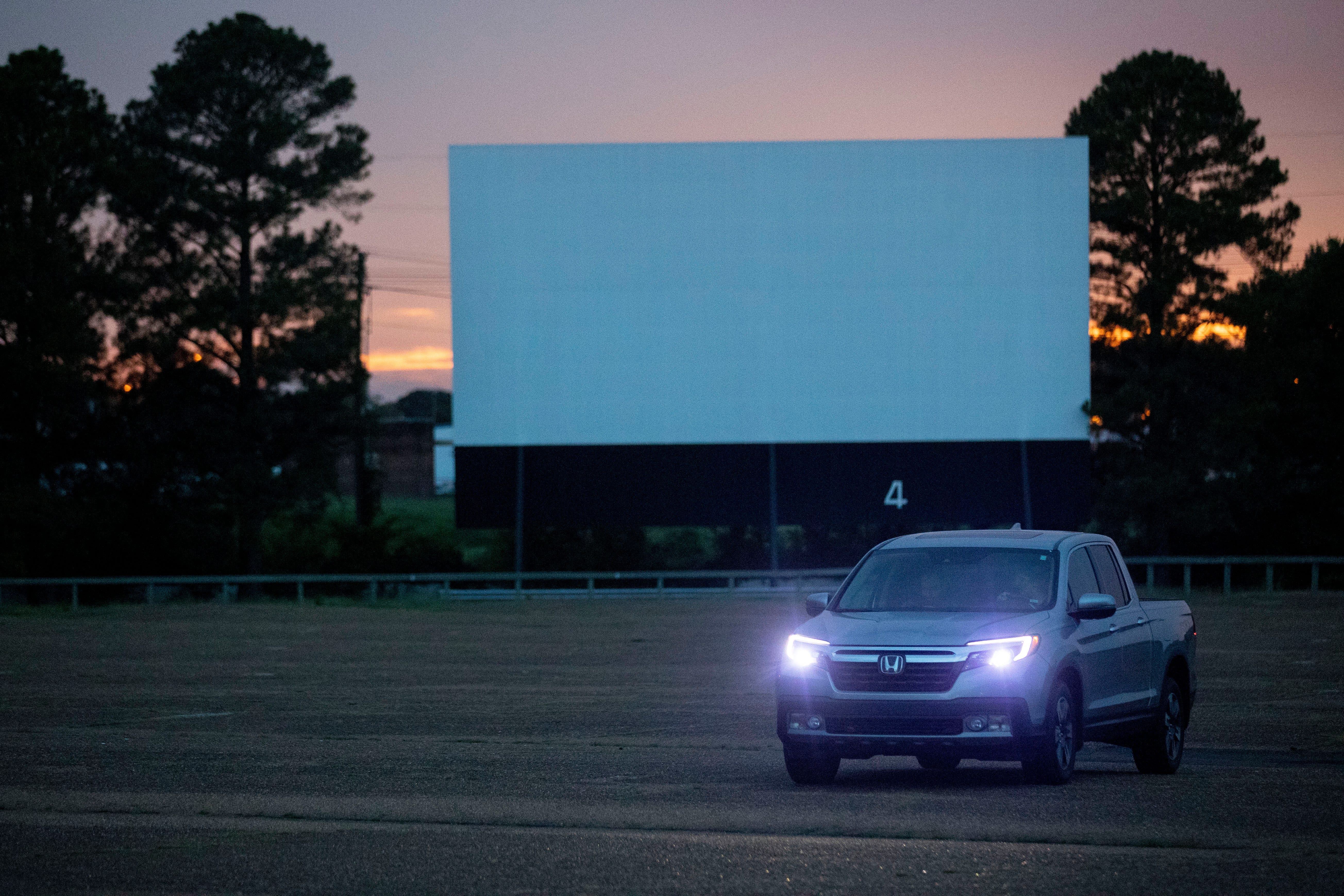
“I actually really like it,” Peters, a 20-year-old Bartlett resident, says of her year-old job. “I think it’s pretty cool we still have a drive-in here.”
When Peters first started working at the drive-in, the concession stand was set up more or less like a cafeteria. Customers entered the building and helped themselves.
The pandemic, of course, changed all that. “Before the pandemic, things were a lot less crazy,” says Peters, whose shift usually runs from about 6 p.m. to midnight.
The drive-in reopened May 15. Since then, customers have remained outside, ordering food from Malco employees who stand behind plastic shields at the entrances. The workers all wear masks.
Even with health protocols in place, concession sales in general are down because fewer customers leave their cars. “People are scared, I guess,” Peters says.
However, “I’m really proud of my fellow employees,” she says. “Just how well everyone works together.”

Beale Street
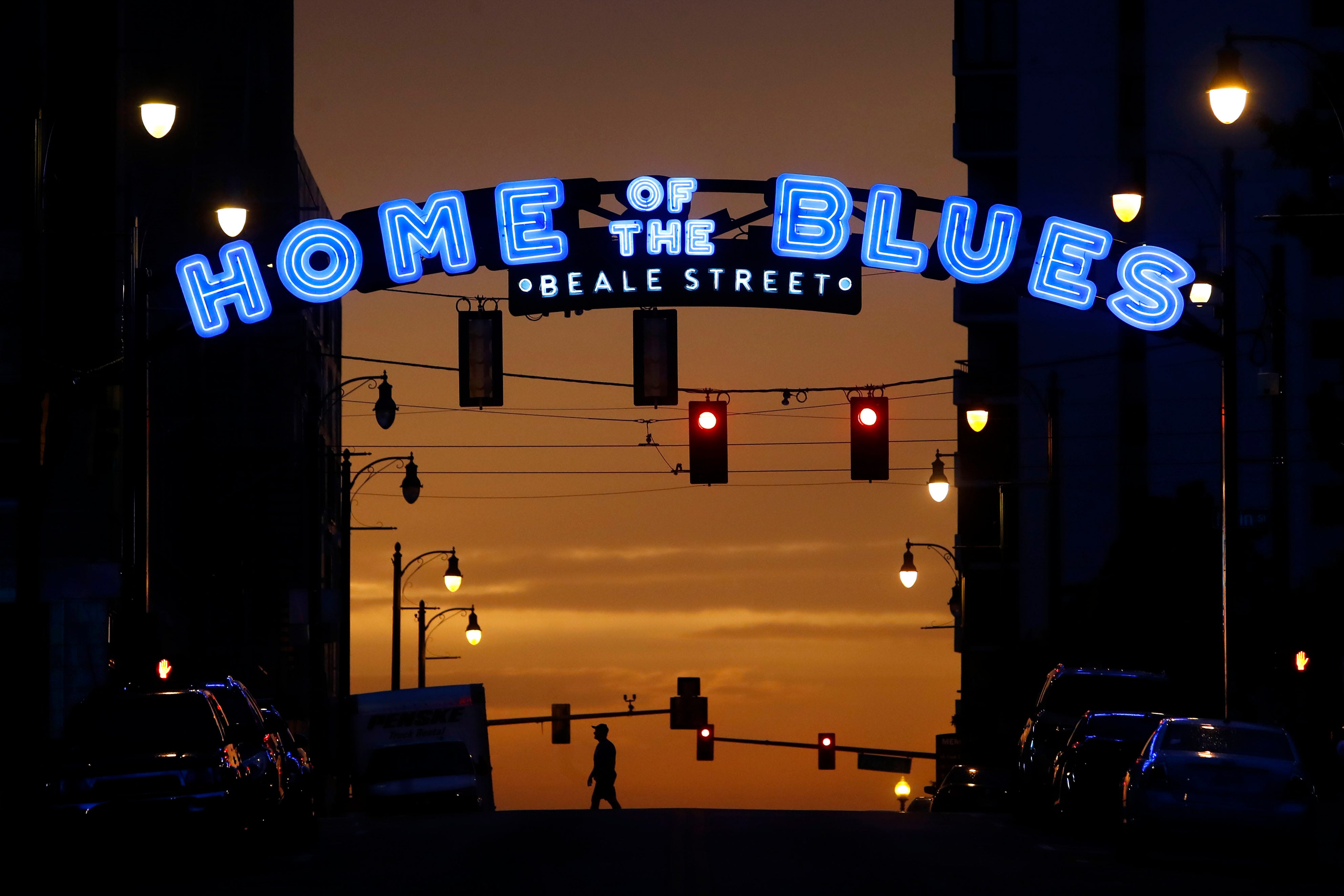
Mickey, named after the famous mouse, comes to work with owner Tamarkus Smith Sr. Man and dog ride side-by-side in the front seat of the purple glowing carriage, pulled through the Downtown streets by Terrific Tom the horse. This pandemic fairytale also has an “unbelievable month” of August sales.
“It hasn’t been too bad for us as of right now,” Smith says, though he’s unsure whether to attribute it to school being out or not. For most of the summer, the carriages never stopped for long at the corner of B.B. King Boulevard and Beale Street, he says.
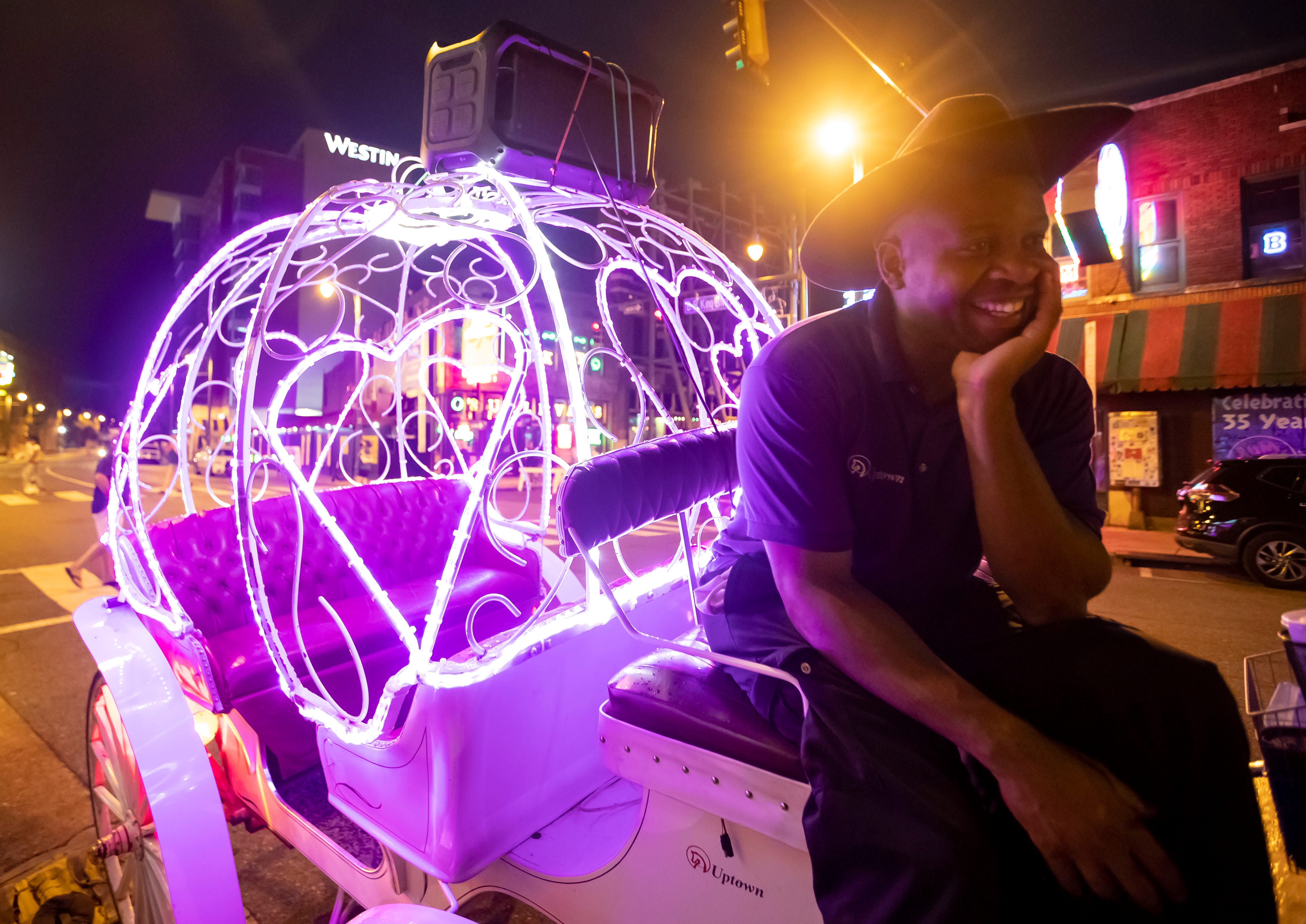
The music and revelry promptly evaporated from Beale Street in mid-March, along with hotel bookings, and carriage rides stopped from then, through April — canceling the several weddings Smith had lined up — and through most of May, up through the week before Memorial Day. By then, though, Memphians had developed what Smith calls a bad case of cabin fever. (Smith caught it too, and, like so many others, bought himself a bike to pass the time.) And by the end of May, more locals than normal have been lining up to hop in the carriage, which is situated a socially-distant 6 feet behind Smith’s seat up front.
“We didn’t know what to expect. We thought for sure it was going to be dead out here,” Smith says. Each tourist attraction he might have pointed out to the out-of-town guests — the FedExForum, the Orpheum, AutoZone Park, “we didn’t have our Triple-A baseball team, the Redbirds” — became a business liability for the independent contractor with Uptown Carriages.
“But of course, we want to thank the Memphians. They actually stepped up,” Smith says. “They did come out, and we did cater to a lot of local Memphians.”
Commercial Appeal staff who contributed to this report: Dima Amro, John Beifuss, Jennifer Chandler, Daniel Connolly, Corinne Kennedy, Max Garland, Bob Mehr, Jason Munz, Samuel Hardiman, Tonyaa Weathersbee, Sarah Macaraeg, Laura Testino, Khari Thompson, Katherine Burgess, Micaela Watts
